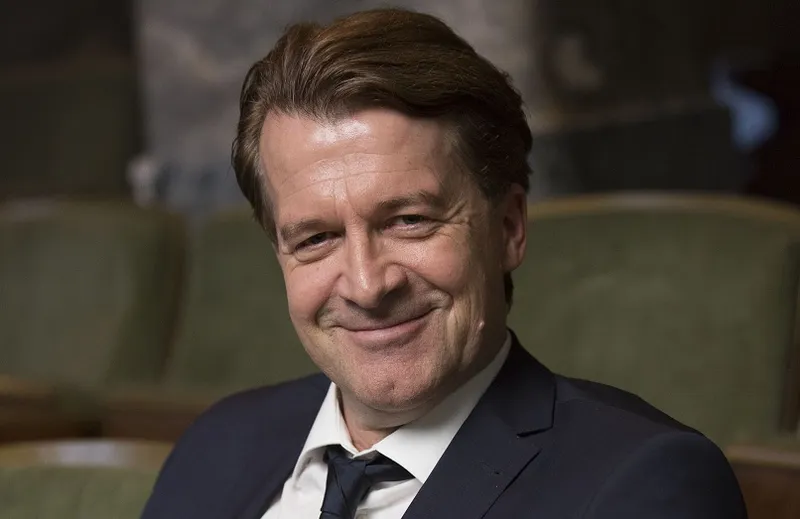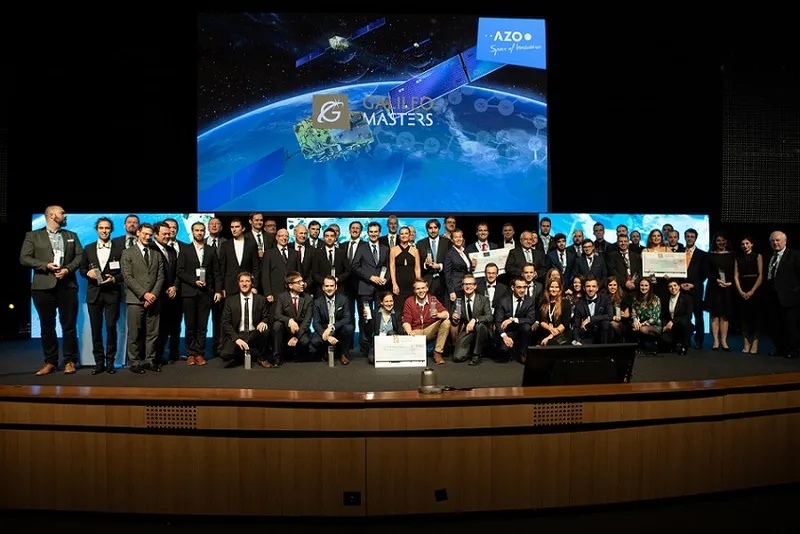How this spacetech competition hub and accelerator spurs the next frontier of entrepreneurship
Thorsten Rudolph of the AZO competition hub in Germany shows how space is the ultimate frontier for new navigation technologies and data applications. In this interview, he invites spacetech startups to take part in the Galileo Masters competition and win a chance for funding and acceleration.
[This article is part of Startup Hatch, the YourStory series on incubators, accelerators, makerspaces, and co-working spaces in the startup ecosystem. See earlier profiles of initiatives at IIT Bombay, IIM Bangalore, BITS Pilani, NCL, Tata Elxsi, Axilor, NID, IIIT-Bangalore, IIIT-Hyderabad, Vellore Institute of Technology, PSG Coimbatore, Workbench Projects, Makers Asylum, Appy Hours, Turning Ideas, NetApp Excellerator, Pitney Bowes Accelerator, TechStars, Indigram Labs, WeWork, Z Nation Lab, Sandbox Startups, Brigade REAP, Target India Accelerator, Zone Startups, Maersk, Anthill Studio, UnternehmerTUM, Ashoka Innovators, and Startup Leadership Programme.]

Thorsten Rudolph, Managing Director, AZO
Thorsten Rudolph is the Managing Director at AZO (German acronym for Anwendungszentrum Gmbh Oberpfaffenhofen), a hub for innovation competitions in aerospace exploration. It is also regarded as Europe’s most successful space incubator, with 155 startups launched since 2004. AZO has partnerships in 90 countries with 160 stakeholder organisations, including 42 business incubators.
AZO’s Masters Series comprises four leading European innovation competitions in the fields of satellite navigation, Earth observation, new space economy, and Low Earth Orbit (LEO), the moon, Mars and beyond. Winners get access to funding and accelerator support, as space technologies and data have applications across broader society.
One of the competitions is the Galileo Masters; Galileo is the global navigation satellite system (GNSS) created by the European Union (EU) through the European GNSS Agency (GSA). The E-GNSS Accelerator, funded by the European Commission, is the first accelerator for the European Galileo programme enabling partners and participants to foster the Galileo/EGNOS market uptake on a broad scale. It is estimated that 96 percent of new chipsets support Galileo, 59 drone-receiver models use Galileo, and 100 percent of new car types sold in Europe feature the Galileo-enabled eCall.
The 2018 edition of Galileo Masters received 266 entries and reached entrepreneurs from over 40 countries, including India. The space-tech market is expected to produce over 70 billion euros in revenue annually in 2025, according to EGNSS.
AZO MD Thorsten Rudolph was earlier Project Manager at the German Aerospace Center (DLR) in Oberpfaffenhofen, near Munich. He is a graduate of the Technical University Munich. He joins us in this interview on the founding vision of the Galileo Masters competition, profiles of some of the winners over the years, and future plans for new engagements with startups.
YourStory: What was the founding vision of the Galileo Masters competition, and how is it supported?
Thorsten Rudolph: When we started the Galileo Masters in 2004, we had a vision to spur the commercial use of satellite navigation signals and services in everyday life. I am proud to say that this vision is now a reality: the Galileo Masters has demonstrated its potential to provide key solutions for Europe’s Global Satellite Navigation Systems (E-GNSS).
With about six billion devices in use around the world, GNSS has become an indispensable technology for all kinds of purposes – and this number is expected to grow to eight billion by 2020. Due to the need for precise positioning and orientation, key technologies such as augmented reality (AR), logistics management and civilian unmanned aerial vehicles (UAVs) constitute part of this great growth for the GNSS market. It is precisely these key future developments that hold great potential for young, innovative companies.
For 15 years, the international innovation competition has served as an accelerating instrument for space-related entrepreneurs and startups. We support innovative ideas at each development stage, with the objective to turn them into business. More than 11,500 developers have participated, with an overall prize pool worth 13 million euros for more than 300 winners. We have involved 200 international judges assigned with the evaluation of submissions.
YS: How many competitions have you had, and who have been some of the winners?
TR: Since 2004, we organised 15 competitions. The 2019 Galileo Masters is the 16th edition. The challenge is led by project manager Ines Kühnert. AZO project managers mainly studied geography and are very experienced in project management.
Each year, we documented all the results in a Results Brochure. All results are available online, and include startup descriptions and solutions. For example, past winners include Wikitude Drive (AR navigation), SciTech Realtime Rescue (personal tracker), CATUAV (collision avoidance system), JOHAN (field sports tracking), KYNEO (open navigation platform), Drones2GNSS (UAV-assisted positioning), and CENTrip (children trip protector). Special prize winners include Smart Gate (time measurement), Lycie (detection of anomalous driving behaviour), Code Blue (smart stretcher), and Locatify (location-based app content).
There are also regional winners, such as Smart Locator (intelligent addresses – Spain), Lympik (virtual sports competitions – Austria), SafeRoute (navigation for the blind – Germany), Galifire (fire detection – Spain), PlanBlue (seafloor mapping – Germany), HIVE (machine navigation – Estonia), AgreenCulture (precision robot navigation – France), ReTiMoS (landslide observation – Greece), Jack in the Box (drone surveillance – Ireland), ARworld (3D AR content – Netherlands), and Norgeskart (rescue mission tracking – Norway).
YS: What would you say are the top three opportunities for entrepreneurs in the
space-tech domain?
TR: Currently, the space-tech domain offers many opportunities. The space industry is not only defined by rapid progress in the area of engineering and lower costs, but also by a convergence of new technologies that will have a revolutionising effect.
Our innovation competition has always been among the first to put forward topics such as big data, data analytics and processing, the evolution of business models, and cloud computing, which are key for pioneering space applications.
YS: What are the key challenges faced by such entrepreneurs, and how can you
help bridge the gap?
TR: The Galileo Masters is not only a prestigious competition for GNSS-related solutions but also serves as Europe-wide and effective support mechanism for entrepreneurs and startups. Galileo Masters winners and finalists benefit from an increased prize pool thanks to the E-GNSS Accelerator, but they can benefit even more if they are among the top 10 Galileo Masters winners. They get invited to an exclusive bootcamp taking place before the Galileo Masters Awards Ceremony.
The top three bootcamp candidates then get awarded in front of a high-ranking audience at the Galileo Masters Awards Ceremony, and receive an additional incubation and acceleration prize package worth 62,000 euros. This E-GNSS Accelerator closed the gap for entrepreneurs to move beyond idea conception into business incubation, and to promote the development phases of true commercial ventures.
YS: What are the selection criteria for participants in your competition?
TR: Enterprises, scientific institutions, and individuals of legal adult age are entitled to participate in the Galileo Masters. All complete entries are assessed by the expert panels of the respective Regional and Special Prize Challenges. Of course, all experts assigned to evaluate the submitted solution have to accept a non-disclosure agreement (NDA) to gain access to the proposals.
The overall winner of the Galileo Masters is selected from among all the Regional and Special Prize winners by an international panel of high-ranking experts. The overall winner is selected by a secret vote and revealed at the annual awards ceremony.
The experts are asked to assess the solution based mainly on the following criteria: potential benefit(s) of the solution, innovation level, significance of the use of GNSS in realising the solution, technological feasibility, and availability of a prototype. Other criteria include chances of becoming a commercial success, investment potential, time to market, legal risks, comparative advantage, and patent eligibility.
YS: Who are some of your institutional partners, and what kinds of agreements are in place?
TR: Our institutional partners are European GNSS Agency (GSA), European Space Agency (ESA), FederalMinistry of Transport and Digital Infrastructure (BMVI), German Aerospace Center (DLR) and the European Commission (EC). All these partners offer a special prize related to a specific topic using satellite navigation.
YS: How would you differentiate your competition from other competitions
in the field?
TR: The Galileo Masters annually awards the best services, products, and business ideas using satellite navigation in everyday life, spurring the development of respective market-driven applications across Europe and beyond. Combined with the E-GNSS Accelerator, it is an unbeatable combination for a competition in the field of GNSS.
Today, more than 11,500 developers took part with an overall prize pool worth 13 million euros for more than 300 winners and 200 international judges assigned with the evaluation of submissions. These numbers reflect the success.

Galileo Masters Winners at the Space Oscars 2018 Awards Ceremony (credit: GM)
YS: What are your plans for the coming three-five years with respect to new themes and
activities for competitions?
TR: Galileo will offer new business opportunities for many market segments. Together with industrial partners we will run new topics in different domains: automotive, mobile, IoT, AI, and 5G, just to name a few.
This year we established two additional challenges, also equipped with cash prizes. Participants are able win the “Startup of the Year” and/or the “Idea of the Year” challenge. Further, we will award the “Product of the Year” at the Space Oscars 2019 (the festive Awards Ceremony of the Galileo Masters and Copernicus Masters). This is in addition to the Regional Challenges and University Challenge.
YS: What are the challenges you face, and how can they be overcome?
TR: The mobile developer market is highly important for the uptake of new services based on Galileo. To address these mobile developers are the main focus and challenge for us in the upcoming years.
YS: How can better partnerships and policies be forged for this sector?
TR: The best way to establish better partnerships between government, industry, and universities is to define and organise common challenges in competitions such as the Galileo Masters.
In my eyes, public funding would be the key to make things a lot easier. Since the implementation of Galileo services is highly essential, public funding would speed up the process.
YS: What are your recommendations or words of inspiration to startups and
entrepreneurs in our audience?
TR: Since Day One, our common aim was to help innovative entrepreneurs to create added value for satellite navigation. I am proud to say that this vision became a reality: the Galileo Masters has grown into the largest innovation network for satellite navigation by bundling a great variety of knowledge and expertise.
Together with its European and global partners, the Galileo Masters acts as a catalyst for economic activities that lead to new companies, new jobs, and new application fields. Since the inception of the Galileo Masters, the majority of the submissions received have been transformed into profitable businesses.
Take this chance, and become the next Galileo Masters Overall Winner!
The meeting with AZO was made possible upon invitation by the German government. The Indian delegation included representatives from Karnataka Startup Cell, NASSCOM, Axilor, and YourStory.







